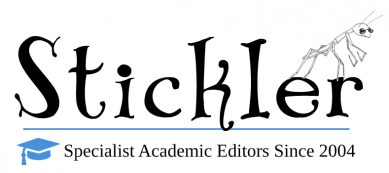A great deal of our proofreading and copy editing work at Stickler comes from master’s and PhD students. In fact, theses and dissertations are some of our favorite jobs, because we can see all the dedication and passion that have gone into them and we love helping edge that hard work towards the finish line. However, with hard work often comes a great deal of stress, anxiety, and other mental health problems, and if these aren’t managed effectively it can seriously undermine your health, not to mention the end result of your dedicated study. Here are some ideas for managing stress and related issues.
Have a Good Support Structure
Surrounding yourself with friends and family is a great way to help you blow off steam and put things in perspective. Isolating yourself is one of the worst things you can do and only fosters anxiety and depression during tough times. It might seem like a tall order, but carving out time in your schedule to go to lunch with a friend, visit family members, have dinner with your significant other—or even just have a 10-minute video chat with someone who helps you stay positive—can make a huge difference.
Don’t Forget to Take Care of Yourself
Stress, although a psychological problem, is a self-feeding phenomenon and can affect your physical body more than you realize. However, this means stress and related issues can also be managed, at least in part, through physical care. Taking care of yourself by eating right, getting enough exercise, and making sleep a priority can help you feel more relaxed and ready to tackle the next stage of your research or writing.
Celebrate Successes, No Matter How Small
As a PhD or master’s student it’s easy to focus only on setbacks, especially if you’re stuck on a chapter or not quite achieving the research results you want. To counter this, remember to celebrate the successes in your life—no matter how small. Keeping a gratitude journal is one way to focus on the positive things, whether these are study-related or not.
Remind Yourself of Your Long-Term Goals
Writing your thesis or dissertation can be a grueling process. It’s easy to lose sight of your long-term goals and get stuck in the dread of everyday challenges. Remind yourself of your long-term goals and the reason you want to obtain your postgraduate degree in the first place. Whether it’s a dream job, a research goal, or even just a personal achievement, keeping sight of the light at the end of the tunnel can remind you of why all the hard work now will be worth it later.
Don’t Forget About Your Life Outside of School
While it’s good to be passionate about your work, it’s also important to maintain hobbies and interests that aren’t related to your thesis or dissertation, and to remind you that there is more to life than your degree. This will also enable you to take a break and get refreshed when your studies become stressful.
Don’t Be Afraid to Seek Help
If you sense your feelings are too much to handle on your own, or even just that you might benefit from some outside perspective, don’t be afraid to seek professional help. Many graduate schools offer counseling and therapy services for students, and there are now several websites, such as www.betterhelp.com, that offer counseling online (this can be a great way to access help quickly and easily). Talking things through with a professional can give you the boost and the personal tools you need to continue with your studies in a healthy way.


















